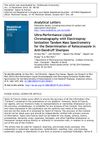 205 citations,
September 2018 in “Nutrients”
205 citations,
September 2018 in “Nutrients” Essential oils from Curcuma species, like turmeric, have compounds that can fight inflammation, cancer, and bacteria, and can also stimulate hair regrowth in bald males.
133 citations,
July 2020 in “Cells” Creating fully functional artificial skin for chronic wounds is still very challenging.
53 citations,
July 2016 in “Cosmetics” Future hair cosmetics will be safer and more effective.
 8 citations,
May 2023 in “Gels”
8 citations,
May 2023 in “Gels” Chitosan hydrogels are promising for repairing blood vessels but need improvements in strength and compatibility.
 8 citations,
October 2021 in “Microbiology spectrum”
8 citations,
October 2021 in “Microbiology spectrum” Researchers identified five new potential targets for leishmaniasis treatment, suggesting repurposing existing drugs could be effective.
 4 citations,
October 2022 in “Microbial Cell Factories”
4 citations,
October 2022 in “Microbial Cell Factories” Certain bacteria from the Citrullus colocynthis plant may be a new source of antibiotics to fight drug-resistant diseases.
2 citations,
December 2023 in “Pharmaceutics” Inhaling medicine may reduce side effects and improve treatment for a major lung cancer type.
 2 citations,
May 2023 in “Experimental dermatology”
2 citations,
May 2023 in “Experimental dermatology” New imaging techniques can assess and track changes in mouse acne without harm, aiding treatment choices.
 1 citations,
November 2023 in “Journal of ovarian research”
1 citations,
November 2023 in “Journal of ovarian research” Agaricus subrufescens improves ovarian function and biochemical health in rats with PCOS.
1 citations,
August 2019 in “IntechOpen eBooks” Mesotherapy might be a useful addition to dental surgery to reduce drug use and side effects, but more research is needed.
1 citations,
January 2018 in “Advances in cancer prevention” Preventing cancer involves lifestyle changes, vaccinations, early screening, and understanding cancer's molecular basis.
January 2024 in “Diagnostics” Long COVID causes a wide range of long-lasting symptoms that change over time and are hard to diagnose and treat.
March 2023 in “Anais Brasileiros De Dermatologia” Topical minoxidil is the best-supported treatment for female hair loss, but personalized plans are needed.
5 citations,
March 2012 in “Veterinary dermatology” A cat developed a skin lesion from a topical solution, which healed with minoxidil treatment.
 19 citations,
May 2020 in “Cells”
19 citations,
May 2020 in “Cells” Substance from human umbilical cord blood cells promotes hair growth.
 14 citations,
January 2015 in “Clinical Nutrition Research”
14 citations,
January 2015 in “Clinical Nutrition Research” MK-R7 supplement with Cistanche Tubulosa and Laminaria Japonica extracts improved hair density and scalp health without adverse effects.
 March 2005 in “Journal of The American Academy of Dermatology”
March 2005 in “Journal of The American Academy of Dermatology” Herbal extract improves hair growth in female pattern baldness.
1 citations,
October 2015 in “The Pharma Innovation Journal” The best way to make a topical treatment for hair loss is to mix Saw Palmetto extract with 48% ethanol at the end of making the lotion.
 5 citations,
February 2021 in “Dermatology and Therapy”
5 citations,
February 2021 in “Dermatology and Therapy” Platelet-rich plasma mesotherapy improved symptoms in patients with corticosteroid-induced rosacea-like dermatitis.
 43 citations,
June 2018 in “Clinics in dermatology”
43 citations,
June 2018 in “Clinics in dermatology” People with atopic dermatitis are more likely to develop other skin conditions due to shared genetics and immune pathways.
 October 2023 in “Cognizance journal”
October 2023 in “Cognizance journal” The document suggests using natural remedies like bloodletting and honey for various health issues but lacks scientific evidence for their effectiveness.
 1 citations,
February 2014 in “Analytical Letters”
1 citations,
February 2014 in “Analytical Letters” The method accurately measures the amount of ketoconazole in anti-dandruff shampoo and cream, and can also be used to monitor the drug in human plasma.
 202 citations,
June 2005 in “Aaps Pharmscitech”
202 citations,
June 2005 in “Aaps Pharmscitech” Lecithin organogels could be good for applying drugs to the skin because they are stable, safe, and can improve drug absorption.
 16 citations,
March 2020 in “Facial Plastic Surgery Clinics of North America”
16 citations,
March 2020 in “Facial Plastic Surgery Clinics of North America” Platelet-Rich Plasma (PRP), a substance from a patient's own blood, can stimulate hair regrowth in people with Androgenetic Alopecia (AGA) who haven't had success with other treatments, but more research is needed to optimize its use.
 5 citations,
January 2018
5 citations,
January 2018 The conclusion is that a new test was created to find substances that affect specific ion channels, and it works well for drug discovery.
 1 citations,
July 2023 in “Cutis”
1 citations,
July 2023 in “Cutis” Scalp rolling might help regrow hair in people with a hair loss condition called Alopecia Areata.
 31 citations,
October 2020 in “Journal of nanomaterials”
31 citations,
October 2020 in “Journal of nanomaterials” Silver nanoparticles made from Grewia optiva leaf extract show strong antibacterial, antioxidant, and hair growth benefits.
 7 citations,
July 2018 in “Journal of Functional Biomaterials”
7 citations,
July 2018 in “Journal of Functional Biomaterials” A new anti-baldness patch effectively treats hair loss by blocking enzymes linked to the condition.
 November 2004 in “Medical Journal of Indonesia”
November 2004 in “Medical Journal of Indonesia” Hormonal imbalances can cause skin and hair problems in women, and treatments that block male hormones can help.
 8 citations,
January 2022 in “Burns and trauma”
8 citations,
January 2022 in “Burns and trauma” Skin cell-derived vesicles can help heal skin injuries effectively.




















